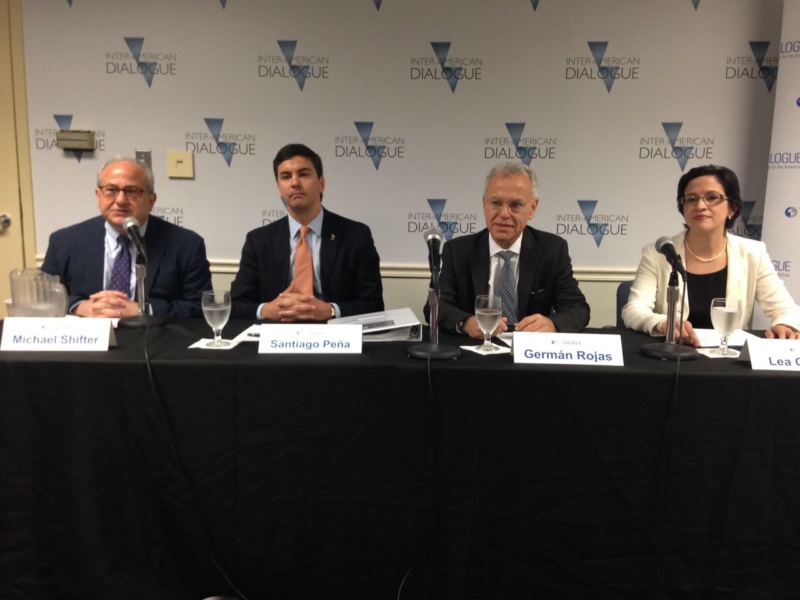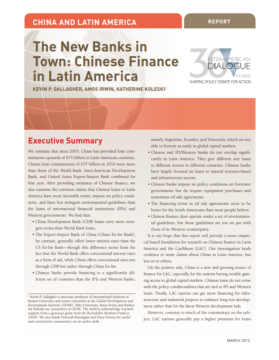Hugo Stay Home
Hugo Chavez, the Venezuelan president, has clearly been enticed by the Libyan drama, where his longtime friend and ally, Muammar al-Qaddafi, is under siege from rebel forces.
On October 4th, the Dialogue hosted an event to discuss how Paraguay sees its future with the Mercosur trade bloc in context of the current economic situation in Paraguay. This was a follow up event to an earlier event held in March. Santiago Peña, Paraguay’s finance minister, Germán Rojas, Paraguay’s Ambassador to the US, and Lea Gimenez, Paraguay’s deputy minister of finance for economy and integration offered insight and analysis on what the future holds for Paraguay within Mercosur, as well as Paraguay’s economic outlook and challenges ahead.
The discussion highlighted the economic and tax reforms Paraguay is undertaking, Paraguay’s role in Mercosur, as well as Mercosur’s current challenges.
Santiago Peña gave an overview of what has occurred in Paraguay over the past three years with regard to the economy and the work of the current administration of Horacio Cartes. The administration is focusing on three types of reforms: economic reform, tax reform, and infrastructure reform, all while maintaining fiscal stability. Peña emphasized that the overall economic goal is to maintain macroeconomic stability and steady growth.
Under economic reform, the Cartes administration has passed a fiscal responsibility law which limits the budget deficit to 1.5 percent of GDP, limits growth in the primary current expenditure to the inflation rate plus 4 percent, and allows salary increases in the public sector only when the minimum wage has been increased. In addition, the social safety net has doubled, reflecting an increase in spending on social welfare. Paraguay has maintained its social gains and not seen its poverty levels increase, unlike much of Latin America in recent years.
With regard to tax reform, Peña emphasized that broadening the tax base is imperative for garnering new revenue. He highlighted that Paraguay has a large rural sector and a large informal sector, which makes collecting taxes difficult to do. In addition, some tax exemptions have been eliminated which should also help to generate government revenue. Peña added that all sectors of the economy need to be sharing in the tax burden.
— The Dialogue (@The_Dialogue) October 4, 2016
The third reform discussed was in the area of infrastructure reform. It is imperative, Peña argued, that Paraguay Invests in better infrastructure for increased trade. Infrastructure spending has increased this year by 30 percent. Since 2013, Paraguay has been making progress on infrastructure development, including a the construction of a new airport, doubling of the main highway connecting Asunción with Ciudad del Este (the second largest city) which is helping with increased interest in investment from Brazil. In addition, Peña mentioned the need for better transportation and access to information for Paraguayans.
Where does Paraguay go from here? Peña highlighted the National Development Plan, which is the vision for the development goals for Paraguay to achieve by 2030. The goals of this plan are: poverty reduction, continued inclusive economic growth to benefit society as a whole, and integrating Paraguay into the world economy. This integration should include not only Latin America but also other emerging markets, including those in Asia.
A primary goal under these reforms is to maintain the low inflation Paraguay has traditionally experienced, avoid debt crises, and maintain macroeconomic stability.
Lea Gimenez discussed the unique challenges for Paraguay with regard to its membership in Mercosur and the future of that trade bloc. After giving a brief history of Mercosur, Gimenez discussed the benefits that Paraguay has experienced as a member of Mercosur and that 80 incipient industries have moved to Paraguay due to its young labor force, the previously mentioned tax reforms, and cheap energy (thanks, in part, to several large-scale hydroelectric projects). President Cartes has met with the other heads of Mercosur member countries, including a meeting on October 3 with Brazilian President Michel Temer where they discussed how to deepen integration. This also highlights President Cartes’ commitment to the bloc. Gimenez mentioned the areas in which Mercosur needs to improve, including unifying food sanitary controls between member countries, more fair trade, enhancing broadband access, and joint infrastructure improvements for highways and bridges, as well as border security issues. Gimenez highlighted that “Mercosur is in a process of reconstruction.” It has lost sight of its role as a tariff union and needs to work on being more integrated economically with the region overall.
Arturo Valenzuela on the successes of Paraguay in recent years #DiálogoMercosur pic.twitter.com/TtDYXDo1WG
— The Dialogue (@The_Dialogue) October 4, 2016
After their prepared remarks, Peña, Rojas, and Gimenez answered questions. Michael Shifter asked a question about where things stand with regard to Venezuela’s membership in Mercosur. Venezuela needs to comply with Mercosur rules (including abiding by democratic principles) by December 1. Peña stated that President Cartes has argued that Venezuela’s compliance is essential and that Paraguay stands by its position that the rule of law be followed in the country. Peña also mentioned that President Cartes has met with members of Venezuela’s opposition. Argentina will likely assume the presidency in January if Venezuela fails to comply. Peña also stated that President Cartes would like for Venezuela to continue to be part of Mercosur. Rojas concurred and reiterated that Paraguay simply wants Venezuela to comply with its human rights commitments.
Rojas mentioned that Mercosur has become more ideological over the years, to the detriment of increased trade. A broader base of trade is needed between Mercosur-member countries. Paraguay has benefitted because more companies have moved to Paraguay and away from some of the other countries due to Paraguay’s favorable tax and labor policies.
Peña highlighted the need for Paraguay to become more involved in trade with Mercosur countries (and more broadly) due to Paraguay’s traditional isolation (For example, Paraguay have its first international bond issuances until 2013). Paraguay is also open to working with Pacific Alliance member countries and has economic agreements with all members save for Mexico (with whom it is working on an agreement). Peña noted that Paraguay is economically about where Chile was 25 years ago, but wants to get to where Chile is now within the next five years, but acknowledged that this will be a challenge given that Paraguay has the second lowest GDP per capita in South America (ahead of only Bolivia). Peña also mentioned that Paraguay is working on being OECD compliant.
In their final remarks, Peña reiterated that in addition to the needed economic reforms, it is important to be able to provide more competition for small and medium-sized enterprises (SME’s) and ways in which to integrate them into the formal sector. He also mentioned the importance of education and discussed a scholarship program created to send Paraguayan students to foreign universities to pursue Masters and PhD degrees. The largest budget increase is in education and the country needs better teacher training and investments in increasing the quality of education. Rojas echoed Peña’s thoughts on education and added that it will be the hardest issue for the country to tackle in coming years. Gimenez restated the need for both regional and global integration, investment, and that high quality jobs are the solution to ending poverty, not conditional cash transfers.
Hugo Chavez, the Venezuelan president, has clearly been enticed by the Libyan drama, where his longtime friend and ally, Muammar al-Qaddafi, is under siege from rebel forces.
Estimates of the volume, composition, and characteristics of Chinese lending to the region since 2005.
Is the Venezuelan government likely to comply with the IACHR’s ruling or will it uphold the ban?
 Hacienda Paraguay / Twitter
Hacienda Paraguay / Twitter
